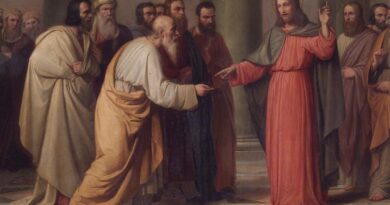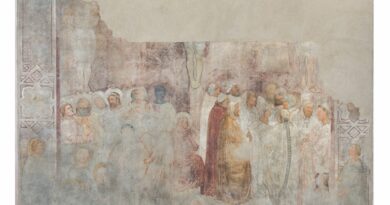Fifth Sunday of Lent/B
Massimo Palombella

In today’s Gospel (Jn 12:20-33) Jesus explicitly announces his passion and death, and to Andrew and Philip he responds with the analogy of the grain of wheat that, by dying, bears much fruit.
Everything Jesus says about his immediate future originates from a question of some Greeks to Philip: “Lord, we want to see Jesus”.
A simple but not obvious question, a question that, if we tell ourselves the truth, belongs to us deeply. In fact, the verb used for “see” is Ιδείν (idein, infinitive aorist active) which expresses a desire, a possibility. The same verb is used for Zacchaeus who wants to “see” Jesus and climbs a sycamore tree (Lk 19:3).
The “seeing” is not a simple and detached observing, but contains a passion, a desire.
It is exactly like looking at the person with whom we feel we can seriously and truly build our future.
It is a ‘seeing’ that underlies compromising life, bonding, love.
To “see” Jesus is to understand, to have intelligence about the truth of our lives, it is to find the way to the fullness of humanity, to “life in abundance”.
Only this “seeing” enables us to maturity in life, to know how to love in good times and bad, to accept pain, to carry the cross, to die, to lose life as a “necessity of love”.
The desire to “see” Jesus is that fundamental and irrepressible need for fullness of life, that same need expressed by Moses when he asked God “Show me your glory” (Ex 33:18).
Giving voice to this need allows it to exist, to manifest itself, at every age.
This need is what saves us from the subtle temptation to reduce our lives to certain and secure things, to horizons without colour, to patterns and attitudes exclusively received from an education, to an existence where everything is there, but the essential is missing.
The Offertory antiphon of today’s celebration is taken from Psalm 118 (Ps 118, 7.10.17.25) with the following text:
“Confitebor tibi, Domine, in toto corde meo.
Retribue servo tuo, ut vivam et custodiam sermones tuos;
vivifica me secundum verbum tuum, Domine.”
(I will praise you, O Lord, with my whole heart;
deal bountifully with your servant, that I may live and observe your word;
revive me according to your word, O Lord).
The attached music, in Gregorian Chant, is taken from the Graduale Triplex published in Solesmes in 1979. The interpretation is by the “Cantori Gregoriani” conducted by Fulvio Rampi. The music track can be found on the CD “Dominus Redemptor – Tempo di Quaresima” published by Denon in 2009.
A blessed Sunday and heartfelt greetings.


